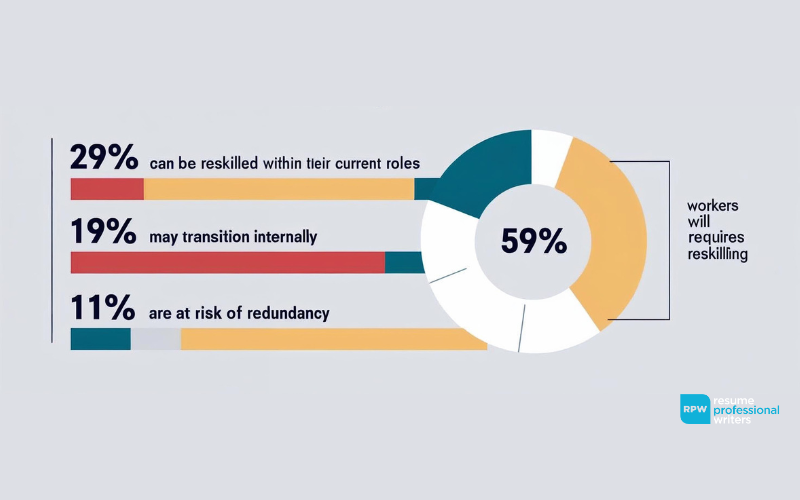A Transformative Decade for Workforces
In an era of generative AI, global economic shifts, climate imperatives, and demographic transformations, the World Economic Forum’s (WEF) Future of Jobs Report 2025 serves as a crucial compass. It reveals how businesses, workers, and policymakers must act to stay competitive, resilient, and relevant. With insights drawn from over 1,000 companies employing more than 14 million workers across 55 economies and 22 industries, the report is more than just predictive—it’s prescriptive.
Between 2025 and 2030, structural labor market transformations are expected to result in the creation of 170 million new jobs and the displacement of 92 million existing roles, yielding a net gain of 78 million jobs. This churn—equal to 22% of today’s employment—demands readiness, reskilling, and strategy.
This article provides a comprehensive breakdown of the report’s key insights, implications, and action points for individuals and organizations. Whether you’re a CEO, HR strategist, educator, or job seeker, this analysis outlines what you need to know—and do—to prepare for the jobs of tomorrow.
Global Labor Market: A Dynamic, Divergent Landscape
While the global unemployment rate has decreased to 4.9%—its lowest since 1991—the labor market reveals growing inequality:
- Youth Unemployment: Stands at 13%, with NEET (Not in Employment, Education, or Training) rates exceeding 25% in lower-income countries.
- Gender Disparities: Women face higher unemployment globally (5.2%) compared to men (4.8%), with wider gaps in lower-middle income economies.
- Jobs Gap: 402 million people globally remain unemployed, underemployed, or discouraged from seeking employment.
- Participation Gaps: Labor force participation has rebounded in high-income economies but stagnates in others. Lower-income regions have seen increased participation but lack the employment growth to match it.
This divergence highlights the need for tailored, localized workforce policies and public-private initiatives aimed at inclusive job creation.
Five Macrotrends Reshaping the Future of Work
1. Technological Transformation
Digital access, generative AI, robotics, and energy tech are transforming business models:
- AI and Information Processing: Cited by 86% of employers as transformative by 2030.
- Robotics and Automation: Expected to transform 58% of businesses.
- Energy Technologies: Expected impact on 41% of employers, particularly in industrial sectors.
AI adoption is expanding rapidly, especially in IT, finance, and media. However, sectors like construction and agriculture lag behind. The digital divide remains a critical issue across countries and sectors.
2. Economic Pressures
- Cost of Living: Ranked by 50% of employers as a transformative trend.
- Slower Economic Growth: Seen by 42% as impacting employment outlooks, with 1.6 million jobs predicted to be displaced.
- Inflation Outlook: While easing overall, remains volatile in regions dependent on food and fuel imports.
Organizations are placing a premium on cost-efficiency, resilience, and innovation as protective measures against economic shocks.
3. Green Transition
The global shift toward sustainability and carbon neutrality is accelerating job creation in green sectors:
- Climate Mitigation Efforts: 47% of employers say it will drive transformation.
- Climate Adaptation: 41% cite it as a major trend.
- Fast-Growing Green Jobs: Renewable Energy Engineers, Environmental Scientists, EV Technicians.
Demand for green skills is outpacing supply, despite a 12% increase in green training uptake globally.
4. Demographic Shifts
The world is simultaneously aging and growing:
- Aging in High-Income Nations: Increasing dependency ratios and talent shortages.
- Youth Population Growth: Especially in Sub-Saharan Africa and South Asia, driving demand for education, healthcare, and digital roles.
- Migration and Talent Mobility: Growing importance of international mobility as a response to aging and labor imbalances.
By 2050, 59% of the global working-age population will reside in lower-income countries.
5. Geoeconomic Fragmentation
- Trade Restrictions: Seen by 23% of employers as disruptive.
- Government Subsidies and Industrial Policy: Impacting 21% of businesses.
- Regional Tensions: Impacting sectors dependent on global supply chains like automotive, electronics, and energy.
Re-shoring, near-shoring, and supply chain diversification are becoming dominant business strategies.
The Jobs Outlook: What Roles Are Rising and Falling?
Fastest-Growing Job Roles (2025–2030)
| Job Role | Key Drivers / Transformation Trends |
|---|---|
| Big Data Specialists | Demand for data-driven decisions, analytics, and AI models |
| FinTech Engineers | Growth in digital banking, cryptocurrency, and mobile payments |
| AI and Machine Learning Specialists | Widespread AI integration and autonomous system deployment |
| Software and Applications Developers | Business digitalization and custom software needs |
| Security Management Specialists | Heightened concerns about cybersecurity and data breaches |
| Data Warehousing Specialists | Explosion in data storage and cloud infrastructure |
| Autonomous and Electric Vehicle Specialists | EV boom and self-driving technology development |
| UI/UX Designers | Digital-first product strategies and user experience optimization |
| Light Truck or Delivery Services Drivers | Surge in e-commerce and last-mile logistics |
| Internet of Things Specialists | Expansion of connected devices and smart cities |
| Data Analysts and Scientists | Enhanced need for real-time data interpretation |
| Environmental Engineers | Increased focus on sustainability and clean infrastructure |
| Information Security Analysts | Regulatory compliance and threat prevention |
| DevOps Engineers | Integration of automation in development and IT operations |
| Renewable Energy Engineers | Net-zero initiatives and energy transition mandates |
| Robotics Engineers | Industrial automation and manufacturing modernization |
| Blockchain Developers | Growth in decentralized finance and secure digital identity systems |
| Data Engineers | Need for structured data pipelines and analytics platforms |
| Digital Transformation Specialists | End-to-end change initiatives in legacy systems |
| Process Automation Specialists | Adoption of RPA (Robotic Process Automation) tools |
| Sustainability Specialists | Rising ESG (Environmental, Social, Governance) standards |
| Renewable Energy Technicians | Expansion of solar, wind, and other alternative energy sources |
| System Engineers | Development of scalable and secure tech infrastructure |
| Organisational Development Specialists | Need for workforce agility and adaptability |
| Online Learning Managers | Digital learning and corporate e-learning acceleration |
| Digital Marketing and Strategy Specialists | Multi-platform digital campaign growth |
| Environmental Protection Professionals | Strengthening of climate resilience programs |
| Solar Energy Installation and System Engineers | Solar tech adoption in residential and commercial properties |
| Database and Network Professionals | Cloud migration and enterprise connectivity |
| Car, Van and Motorcycle Drivers | Gig economy and urban delivery infrastructure |
| Full Stack Engineers | Versatile development for front-end/back-end systems |
| Food Scientists and Technologists | Innovations in plant-based food and nutrition tech |
| ICT Operations and User Support Technicians | Enterprise IT support and cloud service operations |
| E-commerce Specialists | Online retail growth and platform management |
| Strategic Advisors | Business continuity and long-term competitiveness planning |
| Social Media Strategists | Online brand positioning and community engagement |
| Hotel and Restaurant Managers | Travel and tourism resurgence |
| Business Development Professionals | Revenue generation and strategic expansion initiatives |
| Personal Care Aides | Aging populations and care sector needs |
| Product Managers | Agile product lifecycle and cross-functional team leadership |
| Business Intelligence Analysts | Real-time insight for operational and strategic decision-making |
| Energy Engineers | Transition to cleaner fuels and carbon-neutral infrastructures |
| Advertising and PR Professionals | Brand storytelling and omnichannel messaging |
| Database Architects | Scalability of data systems and data security needs |
| Risk Management Specialists | Uncertainty in global supply chains and finance |
| Project Managers | Digital and physical infrastructure rollout |
| Sales and Marketing Professionals | Innovation in go-to-market strategies and consumer behavior analysis |
| Social Scientists and Related Workers | Research in social policy, tech impacts, and human behavior |
| Supply Chain and Logistics Specialists | Realignment of global supply networks and automation adoption |
| Economists | Macro- and microeconomic scenario modeling |
| Management and Organisation Analysts | Process reengineering and strategic restructuring |
| University and Higher Education Teachers | Expansion of access to tertiary education |
| Industrial and Production Engineers | Lean manufacturing and continuous process improvement |
| Chefs and Cooks | Rising demand in hospitality and food entrepreneurship |
Fastest-Declining Jobs by 2030
| Job Role | Key Drivers of Decline |
|---|---|
| Data Entry Clerks | AI automation of clerical work |
| Bank Tellers and Related Clerks | Online banking and fintech adoption |
| Material-Recording and Stock-Keeping Clerks | Inventory management systems and digital tracking |
| Door-to-Door Sales Workers, News and Street Vendors | Decline of print media and in-person sales |
| Administrative Assistants and Executive Secretaries | Digital assistants and automation of scheduling |
| Legal Secretaries | Use of contract generation and document management tools |
| Printing and Related Trades Workers | Shift to digital publishing and communications |
| Legal Officials | AI-driven legal research and automation |
| Postal Service Clerks | Reduction in physical mail volume |
| Telemarketers | Automated outreach and AI-generated messaging |
| Accounting, Bookkeeping and Payroll Clerks | Financial software and automated reconciliation tools |
| Transportation Attendants and Conductors | Self-service transportation platforms |
| Cashiers and Ticket Clerks | Self-checkout systems and mobile ticketing |
| Graphic Designers | Generative AI tools and templated design platforms |
| Claims Adjusters, Examiners, and Investigators | AI and digital claims evaluation |
| Accountants and Auditors | Automation in financial auditing and bookkeeping |
| Security Guards | Sensor-based surveillance and robotic patrols |
| Client Information and Customer Service Workers | AI chatbots, voicebots, and NLP agents |
| Assembly and Factory Workers | Robotic process automation and smart factories |
| Building Caretakers, Cleaners and Housekeepers | Cleaning robots and IoT building management |
| Statistical, Finance and Insurance Clerks | Integrated dashboards and cloud finance tools |
| Credit and Loans Officers | AI risk scoring and digital loan approval |
| Paralegals and Legal Assistants | Document AI and legal case analysis tools |
| Insurance Underwriters, Valuers, and Loss Assessors | Algorithmic underwriting and fraud detection systems |
| Recruiters and Technical Recruiters | AI candidate screening and hiring workflow software |
| Mining, Petroleum and Extraction Workers | Energy transition and remote-controlled machinery |
| Mechanics and Machinery Repairers | Modular equipment design and predictive maintenance |
| Heavy Truck and Bus Drivers | Autonomous vehicle development |
| Compliance Officers | Real-time compliance software and monitoring tools |
| Vocational and Special Education Teachers | Decreased demand due to shrinking student population |
| Chemical Processing Plant Operators | Smart chemical plants and process control systems |
| Survey Researchers | Automated survey collection and big data analytics |
| Power Production Plant Operators | Renewable grid management and remote monitoring |
| Shop Salespersons | E-commerce platforms and automated POS systems |
| Business Services and Administration Managers | Organizational flattening and digital operations |
Skills Outlook: Resilience, Tech, and Human Intelligence
By 2030, 39% of core skills identified in 2025 will become irrelevant, as employers increasingly prioritize analytical thinking, AI proficiency, and curiosity, while placing less value on physical and manual skills, which are consistently declining.
Most In-Demand Core Skills
- Analytical Thinking (Top skill)
- AI and Big Data
- Resilience and Flexibility
- Creative Thinking
- Technological Literacy
- Cybersecurity
- Environmental Stewardship
- Emotional Intelligence
Conversely, physical and manual skills such as dexterity, endurance, and precision are in notable decline.
Reskilling and Organizational Strategy
- 59% of workers will require reskilling.
- 29% can be reskilled within current roles.
- 19% may transition internally.
- 11% are at risk of redundancy.

Employers are prioritizing upskilling (85%), hiring for new skills (70%), and improving employee well-being (64%).
Future Work Models and Policy Needs
- Hybrid and remote models remain prevalent.
- Flexibility and well-being are linked to retention.
Governments must:
- Invest in national reskilling programs
- Expand digital infrastructure
- Create inclusive labor market incentives
- Align education systems with evolving job demands
Human-Machine Collaboration: Not a Threat, But a Partnership
The report emphasizes the evolving frontier between human and machine tasks:
- In 2025: 47% of tasks are done solely by humans.
- By 2030: Only 33% of tasks will be human-only; 33% will be machine-only; and 34% will involve human-machine collaboration.
Automation is not just about replacing labor—it’s about augmenting performance, reducing repetition, and boosting productivity.
However, for this vision to succeed, upskilling and redesigning workflows around collaboration—not competition—with technology is critical.
Upskilling and Workforce Transformation
Reskilling is not optional—it’s survival. The WEF report shows:
- 59 out of 100 workers will need to retrain by 2030.
- Of these:
- 29 can upskill within current roles.
- 19 can transition internally.
- 11 are at risk of job loss without retraining.
The largest barrier to transformation? Skill gaps—cited by 63% of employers.
Organizational Responses
- 85% of employers plan to prioritize upskilling.
- 70% will hire new talent with future-proof skills.
- 64% consider employee well-being and flexibility essential to retain talent.
Industry and Regional Differences: Not All Trends Are Equal
Top Industries Impacted
- Automotive, Aerospace, and Energy: Rapid automation and climate adaptation.
- Education and Healthcare: Driven by demographic changes.
- IT and Telecom: Tech-first reskilling and GenAI adoption.
Regional Contrasts
- North America: High AI adoption, strong DEI initiatives (96%).
- Asia-Pacific: Fastest green transition and tech diffusion.
- Africa and Central Asia: Lagging in automation; higher unemployment risks.
DEI, Talent Mobility, and the Future of Work Culture
Diversity, Equity, and Inclusion (DEI) is now seen as a strategic workforce advantage:
- 83% of companies have active DEI initiatives, up from 67% in 2023.
- 47% of employers now see DEI as a way to expand talent pools.
Meanwhile, talent mobility is increasing, with businesses shifting towards flexible work models and global skill acquisition.
Policy Implications: A Call for Multilateral Action
Governments must align policy with workforce transformation goals:
- Subsidize upskilling and green skilling programs.
- Invest in digital infrastructure and AI governance.
- Foster cross-sector collaboration to bridge gaps in employment and education.
Public-private partnerships will be essential in shaping a fair, inclusive, and prosperous work future.
Empower Your Career in the Age of AI and Automation
As we step into a new era of rapid job evolution, preparing for change isn’t just smart—it’s essential. Whether you’re navigating career reinvention, entering a new industry, or simply updating your skillset, one thing remains true:
A future-ready career starts with a future-ready resume.
Let our expert resume writers help you stand out in this highly competitive, tech-driven market. From AI-aligned resumes to executive CVs tailored for high-growth industries, you deserve a professional edge that captures your strengths and unlocks opportunity.
Take the first step toward job security and advancement—partner with Resume Professional Writers and let your credentials speak powerfully in 2025 and beyond.








